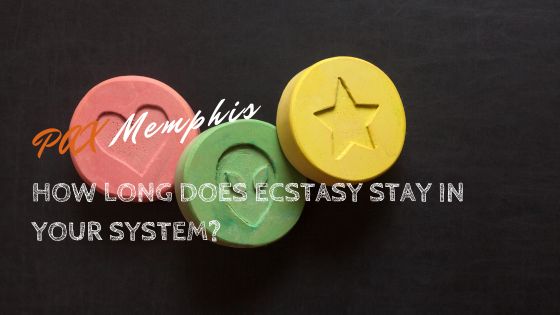Ecstasy is a slang term for a synthetic drug called MDMA. Also called molly, this drug can cause stimulant effects like increased energy and hallucinogenic effects like altered perception. Most people who abuse ecstasy do so in party, club, or rave settings.
According to the National Institute on Drug Abuse (NIDA), 2.2 million people reported using ecstasy in 2021.
If you or a loved one misuses ecstasy, you might be wondering how long it stays in your system. How long MDMA stays in your body depends on a variety of factors, including the dose you take and how frequently you consume it. That said, it has a half-life of 8 to 9 hours, which means it can take up to two days for your body to flush it out.
How Long Do the Effects of Ecstasy Last?
Ecstasy affects a variety of neurotransmitters in your brain, including dopamine, norepinephrine, and serotonin. These chemicals are responsible for mood, energy levels, feelings of trust, and your sexual drive. Ecstasy can cause feelings of euphoria, increased energy, feelings of closeness with others, changes in sensory perception, and sexual desire.
The effects of MDMA begin 30 minutes after you consume it. Typically, the effects last anywhere between 3 to 6 hours. The common side effects of ecstasy include:
- A rush of euphoria
- Warm emotional feelings
- Openness and trust in others
- Heightened sensory perceptions
- Dry mouth
- Jaw clenching
- Muscle tension
- Nausea and vomiting
- Excessive sweating
- Dehydration and thirst
- Increased energy
- Sensitivity to light
Once the effects of ecstasy begin to wear off, you might experience a “comedown.” Ecstasy causes your brain to release high levels of serotonin, and when it wears off, your brain is depleted of it, so it is normal to feel depressed or sad after the drug wears off. You might also experience trouble sleeping, memory issues, and difficulties with attention.
How Long Does Ecstasy Stay in Your System?
A drug’s half-life explains how long it takes your body to eliminate half of a substance. Typically, it takes 4 to 5 half-lives for your body to completely flush out a drug. The half-life of MDMA is between 8 to 9 hours, it could take up to two days for it to leave your system.
MDMA will leave behind metabolites in different areas of your body. These metabolites are what drug tests look for to detect ecstasy or MDMA. The type of drug test being used will determine the amount of time ecstasy can be detected in your body.
Urine
Urine tests are the most commonly used type of drug test because they are relatively cheap and minimally invasive. While standard urine panels do not detect ecstasy, a specialized panel can find it in your system for up to four days after your last dose.
Saliva
Saliva tests are not used as frequently as urine tests because they offer shorter detection times. Law enforcement officers may use them in the field to determine if you are under the influence while driving. You can test positive for MDMA for up to two days after your last dose.
Blood
Blood tests are usually used in hospital settings by medical professionals to see if you have illicit substances in your blood. Detection windows for ecstasy are about 1 to 2 days after your last dose.
Hair
Hair follicle tests are not commonly used for a couple of reasons. First, they are expensive to send off to the lab to be examined. Additionally, studies have found that hair tests are unreliable because they might discriminate based on hair color.
Despite this, some places still used hair tests before offering employment. If you are taking a hair test, they can detect ecstasy in your system for up to 90 days after your last dose.
What Factors Influence How Long Ecstasy Remains in Your Body
Usually, ecstasy will be out of your system within two days. However, many factors can affect how long MDMA stays in your body. For example, if you have been abusing MDMA for a year, you will have it in your system longer than a first-time user.
Other factors that influence the length of time that ecstasy remains in your body include:
- Dose and frequency of use
- Method of administration (i.e. smoking or snorting)
- Height and BMI
- The speed of your metabolism
- Whether you have consumed other substances
- Underlying health conditions like liver or kidney disease
- Age and biological sex
- Nutrition and hydration levels
If you or a loved one suffer from an ecstasy addiction, it’s time to seek help. Since there is no way to flush MDMA out of your body to pass a drug test, the best thing to do is get sober. Drug rehab programs can offer the tools and support you need to overcome a substance abuse disorder.
Find Help for Ecstasy Abuse and Addiction
Ecstasy addiction is not easy to overcome. If you are struggling with ecstasy abuse, PAX Memphis is here to help. We can connect you with a top-rated addiction treatment center in your area that specializes in treating MDMA addiction.
Contact us today to learn more about recovery from ecstasy abuse.
Medically Reviewed: September 25, 2019

All of the information on this page has been reviewed and verified by a certified addiction professional.










